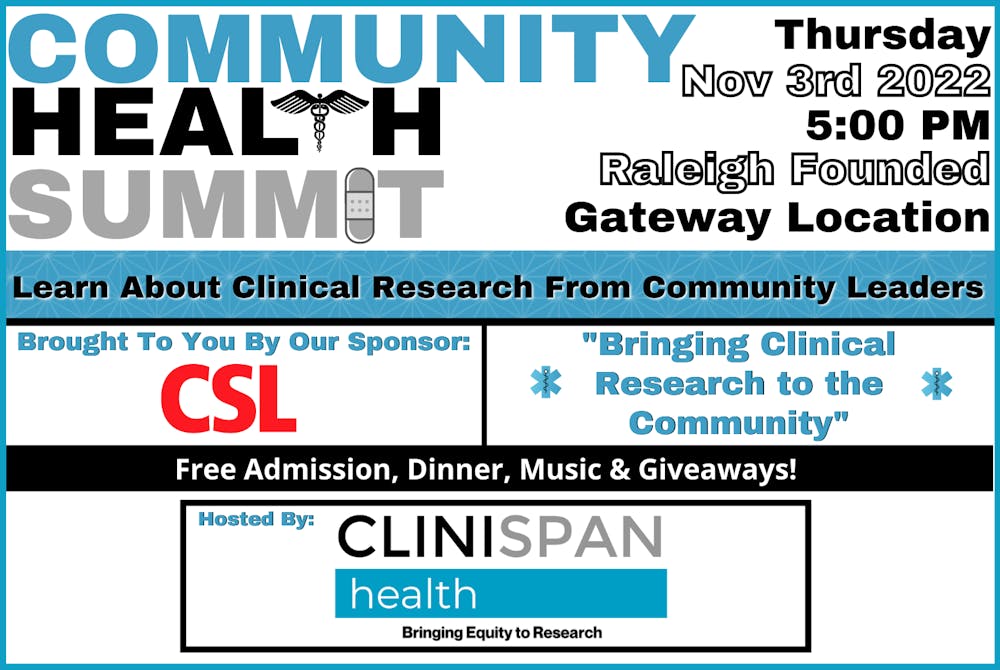On Thursday, November 3rd at Raleigh Founded Gateway there will be a free Community Health Summit hosted by CliniSpan Health and CSL. Click here to register.
● Where: Raleigh Founded Gateway (2409 Crabtree Blvd, Suite 107)
● When: November 3rd, 2022 from 5-8pm
● What: Catered Dinner and Music from Grooveslingers
Clinical trials have long been used to test new treatments before they are offered to the public. These trials are an essential step in the treatment development process since it allows scientists to understand how their treatments will impact human patients. Without them, breakthroughs in treating serious diseases and medical conditions would be nearly impossible.
Due to their wide use within the medical community, clinical trials are constantly seeking to perfect processes and protocols. One of the largest issues with clinical trials is that the participants are not diverse enough to represent all the people served by their outcomes. The lack of diversity in clinical trials limits results and keeps both scientists and those of minority backgrounds from understanding the full effects a treatment can have on the full population.
Diversity issues stem largely from the lack of trust people belonging to minority groups have in the healthcare system, for reasons found in past experiences.
In the past, minority populations were exploited and used for clinical research without giving their express consent. The Tuskegee Institute, who conducted a syphilis study from 1932 to 1972, violated the rights of 600 Black men, many of whom were poor and illiterate sharecroppers.
However, the government has since made progress in ensuring that clinical trials are more ethical.
“Nowadays, research institutions must follow strict rules to protect and safeguard the rights of all study participants,” said Rashaad Galloway, co-founder and chief operating officer of CliniSpan Health, a software platform designed for underrepresented groups to access clinical trials.
“For example, they must provide information about the clinical study and make participants aware of potential risks prior to an individual’s agreement to participate,” Galloway said. “Additionally, study participants have the right to leave a clinical study at any time for any reason.”
While these policies help keep trials ethical, people are still wary of being a human research subject.
To make sure that a clinical trial can be conducted safely with participants, all treatments go through rigorous testing beforehand. Clinical trials are one of the last steps in the production process. This process takes years to complete, so by the time a clinical trial is green lit, the experimental treatment is well-studied.
Additionally, any clinical trial must undergo a review from an ethical board before researchers can start recruiting human participants. These reviews are designed to protect research participants by weighing potential benefits against possible risks.
It is easy to say that all these modern policies make clinical trials safe to participate in. For those who are still hesitant or are interested in learning more, there will be a free event hosted by CliniSpan Health and CSL, a global biotechnology company.
The event will feature community health professionals and real patients who will speak on clinical research study participation. Additionally, they will share about clinical research organizations and entities in the Raleigh-Durham area.
“We hope this community gathering will help spread the word about clinical research and help more people understand they have the option of participating in research related to common diseases and health concerns” said Galloway.





